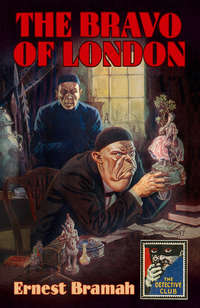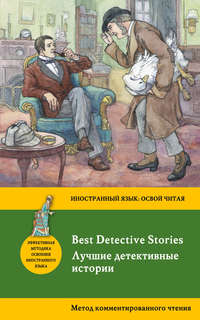 полная версия
полная версияMax Carrados
“You still mean that – seriously?”
“I notice in you a chronic disinclination to take me seriously, Louis. It is really – to an Englishman – almost painful. Is there something inherently comic about me or the atmosphere of The Turrets?”
“No, my friend,” replied Mr Carlyle, “but there is something essentially prosperous. That is what points to the improbable. Now what is it?”
“It might be merely a whim, but it is more than that,” replied Carrados. “It is, well, partly vanity, partly ennui, partly” – certainly there was something more nearly tragic in his voice than comic now – “partly hope.”
Mr Carlyle was too tactful to pursue the subject.
“Those are three tolerable motives,” he acquiesced. “I’ll do anything you want, Max, on one condition.”
“Agreed. And it is?”
“That you tell me how you knew so much of this affair.” He tapped the silver coin which lay on the table near them. “I am not easily flabbergasted,” he added.
“You won’t believe that there is nothing to explain – that it was purely second-sight?”
“No,” replied Carlyle tersely; “I won’t.”
“You are quite right. And yet the thing is very simple.”
“They always are – when you know,” soliloquized the other. “That’s what makes them so confoundedly difficult when you don’t.”
“Here is this one then. In Padua, which seems to be regaining its old reputation as the birthplace of spurious antiques, by the way, there lives an ingenious craftsman named Pietro Stelli. This simple soul, who possesses a talent not inferior to that of Cavino at his best, has for many years turned his hand to the not unprofitable occupation of forging rare Greek and Roman coins. As a collector and student of certain Greek colonials and a specialist in forgeries I have been familiar with Stelli’s workmanship for years. Latterly he seems to have come under the influence of an international crook called – at the moment – Dompierre, who soon saw a way of utilizing Stelli’s genius on a royal scale. Helene Brunesi, who in private life is – and really is, I believe – Madame Dompierre, readily lent her services to the enterprise.”
“Quite so,” nodded Mr Carlyle, as his host paused.
“You see the whole sequence, of course?”
“Not exactly – not in detail,” confessed Mr Carlyle.
“Dompierre’s idea was to gain access to some of the most celebrated cabinets of Europe and substitute Stelli’s fabrications for the genuine coins. The princely collection of rarities that he would thus amass might be difficult to dispose of safely but I have no doubt that he had matured his plans. Helene, in the person of Nina Bran, an Anglicised French parlourmaid – a part which she fills to perfection – was to obtain wax impressions of the most valuable pieces and to make the exchange when the counterfeits reached her. In this way it was obviously hoped that the fraud would not come to light until long after the real coins had been sold, and I gather that she has already done her work successfully in several houses. Then, impressed by her excellent references and capable manner, my housekeeper engaged her, and for a few weeks she went about her duties here. It was fatal to this detail of the scheme, however, that I have the misfortune to be blind. I am told that Helene has so innocently angelic a face as to disarm suspicion, but I was incapable of being impressed and that good material was thrown away. But one morning my material fingers – which, of course, knew nothing of Helene’s angelic face – discovered an unfamiliar touch about the surface of my favourite Euclideas, and, although there was doubtless nothing to be seen, my critical sense of smell reported that wax had been recently pressed against it. I began to make discreet inquiries and in the meantime my cabinets went to the local bank for safety. Helene countered by receiving a telegram from Angiers, calling her to the death-bed of her aged mother. The aged mother succumbed; duty compelled Helene to remain at the side of her stricken patriarchal father, and doubtless The Turrets was written off the syndicate’s operations as a bad debt.”
“Very interesting,” admitted Mr Carlyle; “but at the risk of seeming obtuse” – his manner had become delicately chastened – “I must say that I fail to trace the inevitable connexion between Nina Brun and this particular forgery – assuming that it is a forgery.”
“Set your mind at rest about that, Louis,” replied Carrados. “It is a forgery, and it is a forgery that none but Pietro Stelli could have achieved. That is the essential connexion. Of course, there are accessories. A private detective coming urgently to see me with a notable tetradrachm in his pocket, which he announces to be the clue to a remarkable fraud – well, really, Louis, one scarcely needs to be blind to see through that.”
“And Lord Seastoke? I suppose you happened to discover that Nina Brun had gone there?”
“No, I cannot claim to have discovered that, or I should certainly have warned him at once when I found out – only recently – about the gang. As a matter of fact, the last information I had of Lord Seastoke was a line in yesterday’s Morning Post to the effect that he was still at Cairo. But many of these pieces – ” He brushed his finger almost lovingly across the vivid chariot race that embellished the reverse of the coin, and broke off to remark: “You really ought to take up the subject, Louis. You have no idea how useful it might prove to you some day.”
“I really think I must,” replied Carlyle grimly. “Two hundred and fifty pounds the original of this cost, I believe.”
“Cheap, too; it would make five hundred pounds in New York to-day. As I was saying, many are literally unique. This gem by Kimon is – here is his signature, you see; Peter is particularly good at lettering – and as I handled the genuine tetradrachm about two years ago, when Lord Seastoke exhibited it at a meeting of our society in Albemarle Street, there is nothing at all wonderful in my being able to fix the locale of your mystery. Indeed, I feel that I ought to apologize for it all being so simple.”
“I think,” remarked Mr Carlyle, critically examining the loose threads on his left boot, “that the apology on that head would be more appropriate from me.”
THE KNIGHT’S CROSS SIGNAL PROBLEM
“Louis,” exclaimed Mr Carrados, with the air of genial gaiety that Carlyle had found so incongruous to his conception of a blind man, “you have a mystery somewhere about you! I know it by your step.”
Nearly a month had passed since the incident of the false Dionysius had led to the two men meeting. It was now December. Whatever Mr Carlyle’s step might indicate to the inner eye it betokened to the casual observer the manner of a crisp, alert, self-possessed man of business. Carlyle, in truth, betrayed nothing of the pessimism and despondency that had marked him on the earlier occasion.
“You have only yourself to thank that it is a very poor one,” he retorted. “If you hadn’t held me to a hasty promise – ”
“To give me an option on the next case that baffled you, no matter what it was – ”
“Just so. The consequence is that you get a very unsatisfactory affair that has no special interest to an amateur and is only baffling because it is – well – ”
“Well, baffling?”
“Exactly, Max. Your would-be jest has discovered the proverbial truth. I need hardly tell you that it is only the insoluble that is finally baffling and this is very probably insoluble. You remember the awful smash on the Central and Suburban at Knight’s Cross Station a few weeks ago?”
“Yes,” replied Carrados, with interest. “I read the whole ghastly details at the time.”
“You read?” exclaimed his friend suspiciously.
“I still use the familiar phrases,” explained Carrados, with a smile. “As a matter of fact, my secretary reads to me. I mark what I want to hear and when he comes at ten o’clock we clear off the morning papers in no time.”
“And how do you know what to mark?” demanded Mr Carlyle cunningly.
Carrados’s right hand, lying idly on the table, moved to a newspaper near. He ran his finger along a column heading, his eyes still turned towards his visitor.
“‘The Money Market. Continued from page 2. British Railways,’” he announced.
“Extraordinary,” murmured Carlyle.
“Not very,” said Carrados. “If someone dipped a stick in treacle and wrote ‘Rats’ across a marble slab you would probably be able to distinguish what was there, blindfold.”
“Probably,” admitted Mr Carlyle. “At all events we will not test the experiment.”
“The difference to you of treacle on a marble background is scarcely greater than that of printers’ ink on newspaper to me. But anything smaller than pica I do not read with comfort, and below long primer I cannot read at all. Hence the secretary. Now the accident, Louis.”
“The accident: well, you remember all about that. An ordinary Central and Suburban passenger train, non-stop at Knight’s Cross, ran past the signal and crashed into a crowded electric train that was just beginning to move out. It was like sending a garden roller down a row of handlights. Two carriages of the electric train were flattened out of existence; the next two were broken up. For the first time on an English railway there was a good stand-up smash between a heavy steam-engine and a train of light cars, and it was ‘bad for the coo.’”
“Twenty-seven killed, forty something injured, eight died since,” commented Carrados.
“That was bad for the Co.,” said Carlyle. “Well, the main fact was plain enough. The heavy train was in the wrong. But was the engine-driver responsible? He claimed, and he claimed vehemently from the first and he never varied one iota, that he had a ‘clear’ signal – that is to say, the green light, it being dark. The signalman concerned was equally dogged that he never pulled off the signal – that it was at ‘danger’ when the accident happened and that it had been for five minutes before. Obviously, they could not both be right.”
“Why, Louis?” asked Mr Carrados smoothly.
“The signal must either have been up or down – red or green.”
“Did you ever notice the signals on the Great Northern Railway, Louis?”
“Not particularly. Why?”
“One winterly day, about the year when you and I were concerned in being born, the engine-driver of a Scotch express received the ‘clear’ from a signal near a little Huntingdon station called Abbots Ripton. He went on and crashed into a goods train and into the thick of the smash a down express mowed its way. Thirteen killed and the usual tale of injured. He was positive that the signal gave him a ‘clear’; the signalman was equally confident that he had never pulled it off the ‘danger.’ Both were right, and yet the signal was in working order. As I said, it was a winterly day; it had been snowing hard and the snow froze and accumulated on the upper edge of the signal arm until its weight bore it down. That is a fact that no fiction writer dare have invented, but to this day every signal on the Great Northern pivots from the centre of the arm instead of from the end, in memory of that snowstorm.”
“That came out at the inquest, I presume?” said Mr Carlyle. “We have had the Board of Trade inquiry and the inquest here and no explanation is forthcoming. Everything was in perfect order. It rests between the word of the signalman and the word of the engine-driver – not a jot of direct evidence either way. Which is right?”
“That is what you are going to find out, Louis?” suggested Carrados.
“It is what I am being paid for finding out,” admitted Mr Carlyle frankly. “But so far we are just where the inquest left it, and, between ourselves, I candidly can’t see an inch in front of my face in the matter.”
“Nor can I,” said the blind man, with a rather wry smile. “Never mind. The engine-driver is your client, of course?”
“Yes,” admitted Carlyle. “But how the deuce did you know?”
“Let us say that your sympathies are enlisted on his behalf. The jury were inclined to exonerate the signalman, weren’t they? What has the company done with your man?”
“Both are suspended. Hutchins, the driver, hears that he may probably be given charge of a lavatory at one of the stations. He is a decent, bluff, short-spoken old chap, with his heart in his work. Just now you’ll find him at his worst – bitter and suspicious. The thought of swabbing down a lavatory and taking pennies all day is poisoning him.”
“Naturally. Well, there we have honest Hutchins: taciturn, a little touchy perhaps, grown grey in the service of the company, and manifesting quite a bulldog-like devotion to his favourite 538.”
“Why, that actually was the number of his engine – how do you know it?” demanded Carlyle sharply.
“It was mentioned two or three times at the inquest, Louis,” replied Carrados mildly.
“And you remembered – with no reason to?”
“You can generally trust a blind man’s memory, especially if he has taken the trouble to develop it.”
“Then you will remember that Hutchins did not make a very good impression at the time. He was surly and irritable under the ordeal. I want you to see the case from all sides.”
“He called the signalman – Mead – a ‘lying young dog,’ across the room, I believe. Now, Mead, what is he like? You have seen him, of course?”
“Yes. He does not impress me favourably. He is glib, ingratiating, and distinctly ‘greasy.’ He has a ready answer for everything almost before the question is out of your mouth. He has thought of everything.”
“And now you are going to tell me something, Louis,” said Carrados encouragingly.
Mr Carlyle laughed a little to cover an involuntary movement of surprise.
“There is a suggestive line that was not touched at the inquiries,” he admitted. “Hutchins has been a saving man all his life, and he has received good wages. Among his class he is regarded as wealthy. I daresay that he has five hundred pounds in the bank. He is a widower with one daughter, a very nice-mannered girl of about twenty. Mead is a young man, and he and the girl are sweethearts – have been informally engaged for some time. But old Hutchins would not hear of it; he seems to have taken a dislike to the signalman from the first and latterly he had forbidden him to come to his house or his daughter to speak to him.”
“Excellent, Louis,” cried Carrados in great delight. “We shall clear your man in a blaze of red and green lights yet and hang the glib, ‘greasy’ signalman from his own signal-post.”
“It is a significant fact, seriously?”
“It is absolutely convincing.”
“It may have been a slip, a mental lapse on Mead’s part which he discovered the moment it was too late, and then, being too cowardly to admit his fault, and having so much at stake, he took care to make detection impossible. It may have been that, but my idea is rather that probably it was neither quite pure accident nor pure design. I can imagine Mead meanly pluming himself over the fact that the life of this man who stands in his way, and whom he must cordially dislike, lies in his power. I can imagine the idea becoming an obsession as he dwells on it. A dozen times with his hand on the lever he lets his mind explore the possibilities of a moment’s defection. Then one day he pulls the signal off in sheer bravado – and hastily puts it at danger again. He may have done it once or he may have done it oftener before he was caught in a fatal moment of irresolution. The chances are about even that the engine-driver would be killed. In any case he would be disgraced, for it is easier on the face of it to believe that a man might run past a danger signal in absentmindedness, without noticing it, than that a man should pull off a signal and replace it without being conscious of his actions.”
“The fireman was killed. Does your theory involve the certainty of the fireman being killed, Louis?”
“No,” said Carlyle. “The fireman is a difficulty, but looking at it from Mead’s point of view – whether he has been guilty of an error or a crime – it resolves itself into this: First, the fireman may be killed. Second, he may not notice the signal at all. Third, in any case he will loyally corroborate his driver and the good old jury will discount that.”
Carrados smoked thoughtfully, his open, sightless eyes merely appearing to be set in a tranquil gaze across the room.
“It would not be an improbable explanation,” he said presently. “Ninety-nine men out of a hundred would say: ‘People do not do these things.’ But you and I, who have in our different ways studied criminology, know that they sometimes do, or else there would be no curious crimes. What have you done on that line?”
To anyone who could see, Mr Carlyle’s expression conveyed an answer.
“You are behind the scenes, Max. What was there for me to do? Still I must do something for my money. Well, I have had a very close inquiry made confidentially among the men. There might be a whisper of one of them knowing more than had come out – a man restrained by friendship, or enmity, or even grade jealousy. Nothing came of that. Then there was the remote chance that some private person had noticed the signal without attaching any importance to it then, one who would be able to identify it still by something associated with the time. I went over the line myself. Opposite the signal the line on one side is shut in by a high blank wall; on the other side are houses, but coming below the butt-end of a scullery the signal does not happen to be visible from any road or from any window.”
“My poor Louis!” said Carrados, in friendly ridicule. “You were at the end of your tether?”
“I was,” admitted Carlyle. “And now that you know the sort of job it is I don’t suppose that you are keen on wasting your time over it.”
“That would hardly be fair, would it?” said Carrados reasonably. “No, Louis, I will take over your honest old driver and your greasy young signalman and your fatal signal that cannot be seen from anywhere.”
“But it is an important point for you to remember, Max, that although the signal cannot be seen from the box, if the mechanism had gone wrong, or anyone tampered with the arm, the automatic indicator would at once have told Mead that the green light was showing. Oh, I have gone very thoroughly into the technical points, I assure you.”
“I must do so too,” commented Mr Carrados gravely.
“For that matter, if there is anything you want to know, I dare say that I can tell you,” suggested his visitor. “It might save your time.”
“True,” acquiesced Carrados. “I should like to know whether anyone belonging to the houses that bound the line there came of age or got married on the twenty-sixth of November.”
Mr Carlyle looked across curiously at his host.
“I really do not know, Max,” he replied, in his crisp, precise way. “What on earth has that got to do with it, may I inquire?”
“The only explanation of the Pont St Lin swing-bridge disaster of ’75 was the reflection of a green bengal light on a cottage window.”
Mr Carlyle smiled his indulgence privately.
“My dear chap, you mustn’t let your retentive memory of obscure happenings run away with you,” he remarked wisely. “In nine cases out of ten the obvious explanation is the true one. The difficulty, as here, lies in proving it. Now, you would like to see these men?”
“I expect so; in any case, I will see Hutchins first.”
“Both live in Holloway. Shall I ask Hutchins to come here to see you – say to-morrow? He is doing nothing.”
“No,” replied Carrados. “To-morrow I must call on my brokers and my time may be filled up.”
“Quite right; you mustn’t neglect your own affairs for this – experiment,” assented Carlyle.
“Besides, I should prefer to drop in on Hutchins at his own home. Now, Louis, enough of the honest old man for one night. I have a lovely thing by Eumenes that I want to show you. To-day is – Tuesday. Come to dinner on Sunday and pour the vials of your ridicule on my want of success.”
“That’s an amiable way of putting it,” replied Carlyle. “All right, I will.”
Two hours later Carrados was again in his study, apparently, for a wonder, sitting idle. Sometimes he smiled to himself, and once or twice he laughed a little, but for the most part his pleasant, impassive face reflected no emotion and he sat with his useless eyes tranquilly fixed on an unseen distance. It was a fantastic caprice of the man to mock his sightlessness by a parade of light, and under the soft brilliance of a dozen electric brackets the room was as bright as day. At length he stood up and rang the bell.
“I suppose Mr Greatorex isn’t still here by any chance, Parkinson?” he asked, referring to his secretary.
“I think not, sir, but I will ascertain,” replied the man.
“Never mind. Go to his room and bring me the last two files of The Times. Now” – when he returned – “turn to the earliest you have there. The date?”
“November the second.”
“That will do. Find the Money Market; it will be in the Supplement. Now look down the columns until you come to British Railways.”
“I have it, sir.”
“Central and Suburban. Read the closing price and the change.”
“Central and Suburban Ordinary, 66-1/2-67-1/2, fall 1/8. Preferred Ordinary, 81-81-1/2, no change. Deferred Ordinary, 27-1/2-27-3/4, fall 1/4. That is all, sir.”
“Now take a paper about a week on. Read the Deferred only.”
“27-27-1/4, no change.”
“Another week.”
“29-1/2-30, rise 5/8.”
“Another.”
“31-1/2-32-1/2, rise 1.”
“Very good. Now on Tuesday the twenty-seventh November.”
“31-7/8-32-3/4, rise 1/2.”
“Yes. The next day.”
“24-1/2-23-1/2, fall 9.”
“Quite so, Parkinson. There had been an accident, you see.”
“Yes, sir. Very unpleasant accident. Jane knows a person whose sister’s young man has a cousin who had his arm torn off in it – torn off at the socket, she says, sir. It seems to bring it home to one, sir.”
“That is all. Stay – in the paper you have, look down the first money column and see if there is any reference to the Central and Suburban.”
“Yes, sir. ‘City and Suburbans, which after their late depression on the projected extension of the motor bus service, had been steadily creeping up on the abandonment of the scheme, and as a result of their own excellent traffic returns, suffered a heavy slump through the lamentable accident of Thursday night. The Deferred in particular at one time fell eleven points as it was felt that the possible dividend, with which rumour has of late been busy, was now out of the question.’”
“Yes; that is all. Now you can take the papers back. And let it be a warning to you, Parkinson, not to invest your savings in speculative railway deferreds.”
“Yes, sir. Thank you, sir, I will endeavour to remember.” He lingered for a moment as he shook the file of papers level. “I may say, sir, that I have my eye on a small block of cottage property at Acton. But even cottage property scarcely seems safe from legislative depredation now, sir.”
The next day Mr Carrados called on his brokers in the city. It is to be presumed that he got through his private business quicker than he expected, for after leaving Austin Friars he continued his journey to Holloway, where he found Hutchins at home and sitting morosely before his kitchen fire. Rightly assuming that his luxuriant car would involve him in a certain amount of public attention in Klondyke Street, the blind man dismissed it some distance from the house, and walked the rest of the way, guided by the almost imperceptible touch of Parkinson’s arm.
“Here is a gentleman to see you, father,” explained Miss Hutchins, who had come to the door. She divined the relative positions of the two visitors at a glance.
“Then why don’t you take him into the parlour?” grumbled the ex-driver. His face was a testimonial of hard work and general sobriety but at the moment one might hazard from his voice and manner that he had been drinking earlier in the day.
“I don’t think that the gentleman would be impressed by the difference between our parlour and our kitchen,” replied the girl quaintly, “and it is warmer here.”
“What’s the matter with the parlour now?” demanded her father sourly. “It was good enough for your mother and me. It used to be good enough for you.”
“There is nothing the matter with it, nor with the kitchen either.” She turned impassively to the two who had followed her along the narrow passage. “Will you go in, sir?”
“I don’t want to see no gentleman,” cried Hutchins noisily. “Unless” – his manner suddenly changed to one of pitiable anxiety – “unless you’re from the Company, sir, to – to – ”





